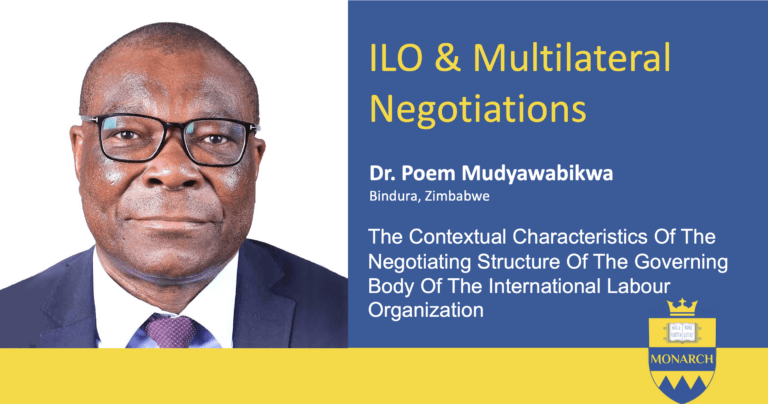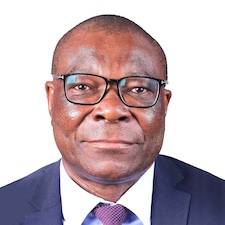Dr. Poem Mudyawabikwa Graduates The Doctor of Literature Program

Monarch Business School is happy to announce that Dr. Poem Mudyawabikwa has graduated the Doctor of Literature program. He completed the requirements with the submission of his dissertation entitled: “The Contextual Characteristics of the Negotiating Structure of the Governing Body of the International aLabour Organization”.
Abstract
The international system exhibits complex and entangled characteristics that compete not only to define, describe and interpret the multilateral negotiations but also to influence them. This phenomenon is perceptible in the United Nations’ (UN) organs and specialised agencies and elsewhere in the multilateral environment. The characteristics range from the multiple actors, inter-actor relationships, power relations, behavioral traits to multi-structures, governance, the engagement modalities and decision-making mechanisms. It is against this backdrop that the present research explored the characteristics of a new conceptual model which better describes and interprets the negotiations that take place in the Governing Body (GB) of the International Labour Office.
The research traces the negotiating model adopted at the formation of the International Labour Organisation (ILO) in 1919 which placed the workers’ and employers’ groups on equal footing with governments. The tripartite nature of the ILO makes it a unique agency within the UN family. The model under exploration evolved over the years partly responding to the development in the broader multilateralism. This is the case, as the ILO and the League of Nations are milestones in multilateralism having been established by the same international conference. The configuration of the government constituent of the Governing Body (GB) of ILO exhibits power imbalance and governance deficits while the verity of the single voice each of the workers’ and employers’ constituents is questionable. The GB itself, is constituted by complex multi-layers of negotiating units.
A triangulated research methodology, constituted by literature review, content analysis and interviews was used to gather data. The literature reviewed, relates to; international relations, negotiations and social justice domains. The content analysed pertains to ILO key instruments on governance and social justice as well as other relevant documents of the ILO GB. Open-ended interviews were conducted with the sampled GB members drawn from the three constituents of the ILO. The interview questions focused on the key elements of the ILO GB negotiations; i.e., the actors, structures within the GB, the engagement processes, consultations, decision making and behavioral traits of the GB members. Out of the 50 targeted GB members and officials of the constituents’ secretariats, 34 participated in the initial interviews conducted face- to -face and online. This represents a 68% response rate.
The main research findings are that the multiple actors and multi-layers of the negotiating units influence the negotiation patterns and that the ILO GB negotiating model exhibits governance deficits and social justice barriers. The following are among the identified characteristics of the new conceptual model that better describes and interprets the ILO GB negotiations; (i) increased actors in the government group, (ii) compatibility between political and official classification of the GB agenda items, (iii) existence of logically sequenced in-session engagement process flows (iv) invigorated efforts to address the governance deficits and ultimately remove the social justice barriers. This is the first conceptual model which contributes new knowledge to the understanding of the evolving structures, intricacies, interactions and power relations among the multiple actors in the international system.
About Dr. Poem Mudyawabikwa
 Dr. Poem Mudyawabikwa is a Doctor of Literature graduate from Monarch Business School Switzerland. He holds a Master of Public Administration and a B.Sc. in Political Science and Administration from the University of Zimbabwe. He also holds an Executive Master In International Politics from CERIS-Centre Europeen de Recherches Internationales et Strategiques in Brussels. Recently, he held the position of Minister-Counsellor at the Zimbabwe Permanent Mission to the United Nations in Geneva. Previous to that, he worked at the Ministry of Public Service Labour and Social Welfare in Zimbabwe.
Dr. Poem Mudyawabikwa is a Doctor of Literature graduate from Monarch Business School Switzerland. He holds a Master of Public Administration and a B.Sc. in Political Science and Administration from the University of Zimbabwe. He also holds an Executive Master In International Politics from CERIS-Centre Europeen de Recherches Internationales et Strategiques in Brussels. Recently, he held the position of Minister-Counsellor at the Zimbabwe Permanent Mission to the United Nations in Geneva. Previous to that, he worked at the Ministry of Public Service Labour and Social Welfare in Zimbabwe.
He has experience in working with International Organizations and Regional Inter-governmental organizations International Labor Organization (ILO), The United Nations Development Programme (UNDP), The United Nations High Commission for Refugees(UNHCR), The Office for the Coordination of Humanitarian Affairs(OCHA), The International Committee of the Red Cross(ICRC) of the African Union’s Commission(AUC), Southern African Development Countries (SADC), the African Regional Labour Administration Centre (ARLAC). At present, he has returned to Zimbabwe.
